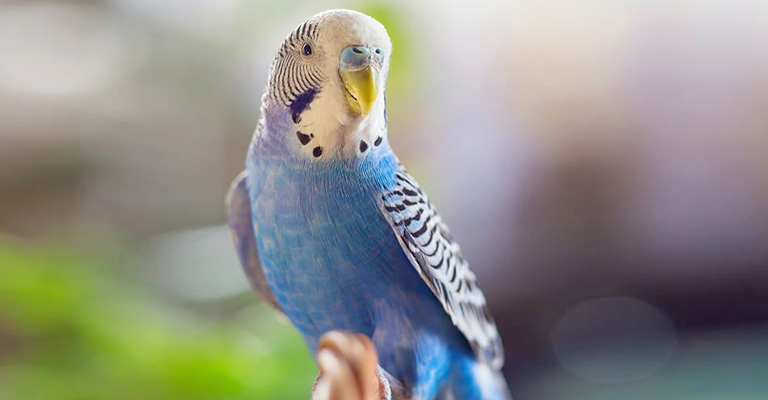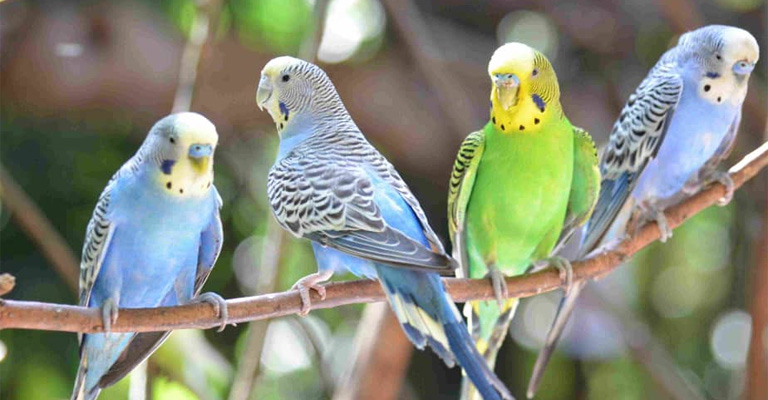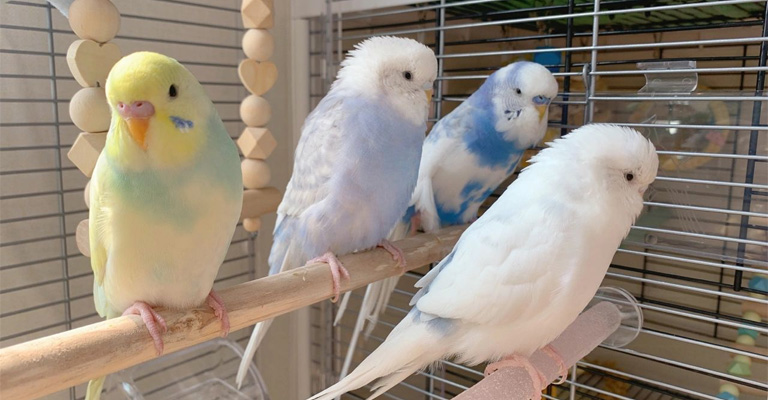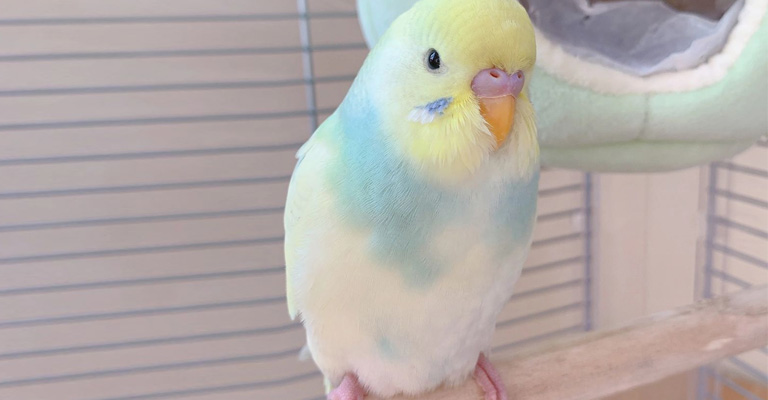Budgerigars, commonly known as budgies or parakeets, are delightful and popular pet birds. One of the most common questions potential budgie owners have is, “Are budgies loud?”
To shed light on this topic, we’ll explore the intricacies of budgie vocalizations and their impact on your daily life. In this blog post, we’ve discussed the various sounds budgies make, their potential meanings, and factors influencing their noise levels.
Your budgie’s vocal behavior can help you provide them with the care and attention they need while maintaining a harmonious living environment for both you and your feathered friend. So, stay focused.

Are Budgies Loud?
Budgies, also known as parakeets, are not typically considered loud birds. They are known for their cheerful chirping and chattering, which can be quite pleasant and not overly loud. Budgies are social creatures and use vocalizations to communicate with their flock or human companions.
While they can be more active and vocal during the day, especially when excited or happy, their noise level is generally manageable and unlikely to be disruptive. However, it’s essential to note that individual budgies may vary in their noise levels. Some may be quieter, while others might be more vocal.
Additionally, the environment and interactions with their owners can influence their vocal behavior. So, compared to larger parrot species, budgies are considered relatively quiet, making them suitable pets for those who prefer a more subdued bird companion.
Understanding Budgie Vocalizations

Budgie vocalizations are a form of communication and expression for these small parakeets. What their various sounds mean can help you better care for and bond with your feathered friend. Here are some common budgie vocalizations and their potential meanings:
Chirping and Singing
Budgies are known for their cheerful chirping and singing, especially during daylight hours. This is usually a sign of contentment, happiness, or excitement. They may do this when they see their favorite person or are exploring a new toy.
Squawking
Loud, repetitive squawking can indicate distress or a call for attention. It might mean they are hungry, bored, or feeling lonely. Providing toys, social interaction, or a change in their environment can help alleviate this.
Purring
Budgies can make a soft, purring sound when they are relaxed and content. It’s a sign that they are comfortable and feeling safe.
Whistling
Budgies are excellent mimickers and can learn to whistle tunes or imitate sounds they hear in their environment. This is a sign of their intelligence and desire to communicate and interact with their human companions.
Hissing or Growling
This is a warning sign that your budgie is feeling threatened or defensive. It’s crucial to respect their boundaries when they exhibit this behavior to avoid stress or bites.
Chattering
Sometimes budgies will have little conversations with themselves or other birds in the flock. It’s a way of maintaining social bonds and can be quite cute to listen to.
Remember that each budgie has its unique personality and vocal patterns, so it’s essential to pay attention to your bird’s specific cues and body language to interpret their vocalizations accurately.
Factors Influencing Budgie Noise Levels

Several factors can influence the noise levels of budgies (parakeets). Understanding these factors can help you manage and potentially reduce their vocalizations:
Breed and Individual Personality
Budgies, like people, have unique personalities. Some may naturally be more vocal than others, regardless of external factors. Additionally, some budgie breeds or color mutations tend to be quieter or noisier.
Age
Young budgies are often more energetic and prone to vocalize than older ones. As they mature, they may become quieter. However, older budgies can also become more vocal if they are trying to communicate something specific.
Socialization
Budgies are social birds, and their need for interaction and attention can influence their noise levels. Loneliness or boredom can lead to increased vocalizations. Providing them with companionship or engaging toys can help alleviate this.
Environmental Stimuli
Budgies are highly sensitive to their surroundings. Loud noises, bright lights, or sudden changes in their environment can trigger increased vocalizations. Keeping their living space calm and predictable can reduce stress-related noise.
Diet and Health
A hungry or sick budgie may vocalize more to signal their distress. Ensure they have a balanced diet and regular veterinary care to address any health issues that may contribute to excessive noise.
Cage Location
The placement of the budgie’s cage can affect their vocalizations. If the cage is near a high-traffic area or a source of constant noise, they may become more vocal. Consider moving the cage to a quieter location if necessary.
Training and Interaction
Budgies can learn to vocalize for attention or rewards. If you respond to their vocalizations consistently, they may use this as a way to get your attention. Training them with positive reinforcement can help modify their behavior.
Mating and Hormones
During the breeding season, budgies may become more vocal, especially if they are trying to attract a mate. Separating males and females during this time can help reduce excessive noise.
Sleep Patterns
Budgies are diurnal, which means they are most active during the day. Covering their cage at night to provide darkness and quiet can help establish a regular sleep routine, reducing early morning noise.
Stimulation
Budgies are intelligent and need mental stimulation. Providing them with toys, puzzles, and activities can keep them engaged and reduce boredom-related noise.
So, budgie noise levels can be influenced by a combination of inherent factors, their environment, and their physical and emotional well-being.
How Does Budgie Noise Impact Your Lifestyle?

Budgie noise can have varying impacts on your lifestyle depending on your tolerance for sound, your living situation, and the specific needs and behavior of your budgie. Here are some ways budgie noise can affect your daily life:
Noise Levels
Budgies are not exceptionally loud birds, but their vocalizations can still be noticeable. The constant chirping and occasional squawking can become a background noise in your home. Some people find this soothing and enjoyable, while others may find it distracting or irritating.
Sleep Patterns
Budgies are diurnal, meaning they are most active during the day. If your budgie starts chirping early in the morning, it can disrupt your sleep patterns, which may be particularly problematic if you need a quiet and uninterrupted night’s rest.
Social Interaction
Budgies are social birds and thrive on interaction with their owners. Their vocalizations can be a way of communicating with you and seeking attention. If you have the time and desire to engage with your budgie, their noise can be a positive aspect of your daily routine.
Stress Levels
Excessive noise, especially in a small living space, can increase stress levels for both you and your budgie. High-stress environments may not be conducive to a peaceful and relaxed lifestyle.
Neighbors and Roommates
If you live in an apartment building or share your living space with others, your budgie’s noise can affect those around you. Consider your neighbors’ tolerance for noise, as loud budgie vocalizations might lead to complaints.
Work or Study
If you work or study from home, budgie noise could potentially be distracting. However, some people find the presence of their budgie to be comforting and conducive to their work or study environment.
Adjustment Period
When you first bring a budgie home, there may be an adjustment period during which they are getting used to their new environment and vocalizing more. This phase can be temporary as they settle in.
To mitigate the impact of budgie noise on your lifestyle:
Provide Mental Stimulation
Ensure your budgie has plenty of toys and activities to keep them engaged and reduce boredom-related noise.
Establish a Routine
Create a consistent daily routine, including sleep and wake times, to help regulate your budgie’s behavior.
Soundproofing
If noise complaints are a concern, consider soundproofing your budgie’s living area or moving their cage to a quieter location in your home.
Training
You can train your budgie to be quieter on command, although this may take time and patience. The impact of budgie noise on your lifestyle is a personal matter.
Some people find the joy of having a budgie companion far outweighs any noise-related inconveniences, while others may need to consider alternative pets or strategies to maintain a quieter living environment.
Tips for Quieting a Loud Budgie

If you have a budgie that’s become particularly loud and you’d like to help them be quieter, there are several strategies you can try:
Provide Mental Stimulation
Boredom can lead to excessive noise. Ensure your budgie has plenty of toys, puzzles, and activities in their cage to keep them mentally engaged. Rotate their toys regularly to maintain their interest.
Companionship
Budgies are social birds and often become quieter when they have a companion. Consider getting another budgie to keep them company. Ensure the two birds get along well and are compatible in terms of temperament.
Training
You can train your budgie to be quieter on command. Whenever your budgie starts making loud noises, gently say “quiet” or another chosen cue. When they pause or lower their volume, reward them with a treat or praise. Consistency is key to reinforcing this behavior.
Create a Routine
Establish a daily routine for your budgie. This includes regular feeding times, playtime, and sleep schedules. Having a predictable routine can help your budgie understand when it’s appropriate to be active and vocal.
Provide Adequate Sleep
Ensure your budgie gets enough sleep at night. Cover their cage with a dark cloth to create a quiet, dark environment. This can help reduce early morning noise.
Soundproofing
If your budgie’s cage is in a common living area, consider soundproofing the room or moving the cage to a quieter location. Adding curtains or wall hangings can help absorb sound.
Social Interaction
Spend quality time with your budgie each day. Interact with them, talk to them, and provide physical attention. Sometimes, they become noisier because they are seeking your companionship.
Address Stress
Identify and eliminate sources of stress in your budgie’s environment. This includes loud noises, sudden movements, or other pets that may be causing anxiety.
Check Health
If your budgie’s noise level suddenly increases, it could be a sign of an underlying health issue. Consult with a veterinarian to rule out any medical problems.
Positive Reinforcement
Reward your budgie for quiet behavior throughout the day, not just during training sessions. Positive reinforcement can encourage them to be quieter overall.
Remember that patience and consistency are essential when trying to reduce your budgie’s noise levels. It may take some time for them to adjust to changes in routine or training commands.
FAQs
No, budgies are not considered loud birds. They produce cheerful chirping and chattering, which is generally pleasant and not excessively noisy. Compared to larger parrot species, they have a much milder noise level, making them suitable for quieter living environments.
Typically, budgies are quiet at night and sleep during the dark hours. Covering their cage can create a dark, quiet environment, encouraging them to rest peacefully and minimize nighttime noise.
Yes, budgies are excellent mimickers. They can learn to mimic loud sounds, including alarm noises or sirens. They can also be trained to repeat words or phrases, which can sometimes be perceived as loud, depending on the individual bird’s vocal abilities.
To reduce budgie noise, provide mental stimulation with toys, establish a routine, ensure proper sleep, consider getting them a companion, train them to be quieter with positive reinforcement, and address any sources of stress or boredom in their environment.
Yes, budgie noise can be managed through training. By consistently using cues like “quiet” and rewarding quieter behavior with treats or praise, you can teach your budgie to reduce excessive noise on command. However, patience and consistency are key to successful training.
Wrapping Up
Budgies are not typically considered loud birds, but they do have their own unique vocalizations. Whether you find their cheerful chirping soothing or occasionally disruptive depends on your personal preferences and living situation.
By providing mental stimulation, companionship, and consistent training, you can manage and even reduce their noise levels.
The joy of having a budgie companion often outweighs any minor inconveniences, making them a delightful addition to many households. Thank you for your time.